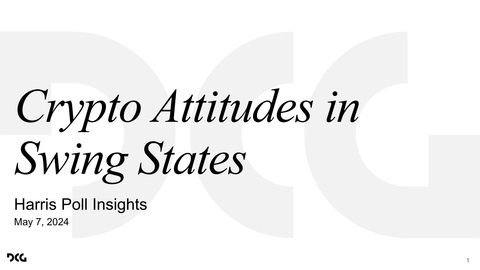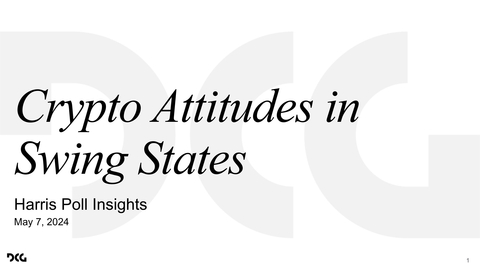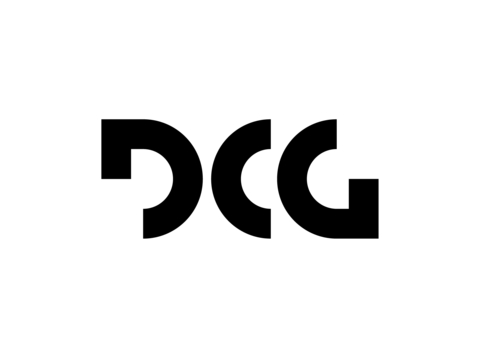WASHINGTON--(BUSINESS WIRE)--DCG, the global investor that builds, buys, and supports blockchain companies, today released a study finding that more than 20% of voters in key battleground states identified crypto as a major issue in the 2024 election, a significant percentage for any candidate running in these states. DCG partnered with The Harris Poll in a survey of 1,201 registered voters from Michigan, Ohio, Montana, Pennsylvania, Nevada, and Arizona, to explore swing state attitudes toward digital currencies and the financial system in the run-up to the election.
To address the interests of a growing population of pro-crypto voters, the poll is released in conjunction with the DCG Founder Fly-In: a two-day event in Washington, D.C. centered around policy discussions between DCG, its portfolio companies, and key congressional leadership. The meetings will include members of the Congressional Blockchain Caucus and the Congressional Artificial Intelligence Caucus.
“This data shows crypto is top of mind for voters in swing Senate states and that a pro-crypto position is a net positive for policymakers and candidates,” said Julie Stitzel, Senior Vice President of Policy at DCG. “The poll also underscores a strong desire for policymakers to establish reasonable regulations that protect consumers without stifling innovation.”
“The recent poll conducted by Harris and DCG confirms what many in the industry have suspected: digital assets have emerged as a significant issue in the upcoming election,” said Kristin Smith, CEO of the Blockchain Association. “These data underscore the increasing relevance of our issues in shaping the electoral landscape of 2024.”
Some of the most compelling findings from the survey include:
Crypto as a voting issue could present a key opportunity for political candidates.
- A sizable number of voters overall (40%) wish political candidates talked more about digital currency.
- The vast majority of both voters who support cryptocurrency and voters overall plan to vote in the upcoming 2024 elections (90%+) and are closely split in party lean.
- Most voters do not trust elected officials to understand innovative technology like crypto, and more than half (55%) are concerned about policymakers stifling innovation via overregulation. The vast majority want policymakers to be sure they understand crypto before regulating.
- Nearly half of voters overall (48%) do not trust political candidates who interfere with crypto. One-quarter say that enthusiasm towards crypto would make them trust a political candidate more. Thirty percent would be more likely to support a political candidate that is friendly to crypto.
- Crypto regulation does have support – about 20-25% of voters and one-third of crypto-positive voters want elected officials to focus on crypto regulation or protections for crypto investors.
The current financial system is broadly unpopular, with widespread voter agreement that the system is inequitable and that younger generations are particularly disadvantaged.
- The current financial system garners negative reactions from voters, with the majority agreeing that the system favors elites over regular people (80%), lacks transparency (79%), is difficult to understand (67%), and that younger generations are set up to fail (63%).
- Conversely, few think that the current financial system is meant for people like me (38%) or fair for all (26%).
- Of the voters who have a positive perception of crypto, the majority (66%) believe it’s easier for people to be financially successful with crypto than it is with more traditional financial avenues, like the stock market.
The complete survey findings, along with detailed analysis and recommendations, is available on the Blockchain Association’s website. DCG remains committed to collaborating with policymakers, community leaders, and stakeholders to foster a more inclusive and resilient financial system.
About DCG
Founded in 2015 by Barry Silbert, DCG is a global enterprise that builds, buys, and invests in blockchain companies all over the world. As the most active investor in the blockchain space, DCG sits at the epicenter of the industry, backing more than 200 companies in 35+ countries. In addition to its investment portfolio, DCG is the parent company of a number of subsidiaries including Grayscale Investments, Foundry, and Luno.
The Harris Poll Method Statement
The research was conducted online in the United States by The Harris Poll on behalf of Digital Currency Group among 1,201 Registered Voters in Arizona, Michigan, Montana, Nevada, Ohio, and Pennsylvania. The survey was conducted April 4 – April 16, 2024.
Data are weighted where necessary by age by gender, race/ethnicity, education, marital status, household size, and household income to bring them in line with their actual proportions in the population. The data was combined using a post weight to create a total, as well.
Respondents for this survey were selected from among those who have agreed to participate in our surveys. The sampling precision of Harris online polls is measured by using a Bayesian credible interval. For this study, the total sample data is accurate to within + 4.1 percentage points using a 95% confidence level. Sampling precision for each state at the 95% confidence level is as follows:
Arizona (+ 9.2 percentage points)
Michigan (+ 8 percentage points)
Montana (+ 8.9 percentage points)
Nevada (+ 9.1 percentage points)
Ohio (+ 9 percentage points)
Pennsylvania (+ 8.4 percentage points)
This credible interval will be wider among subsets of the surveyed population of interest. All sample surveys and polls, whether or not they use probability sampling, are subject to other multiple sources of error which are most often not possible to quantify or estimate, including, but not limited to coverage error, error associated with nonresponse, error associated with question wording and response options, and post-survey weighting and adjustments.




